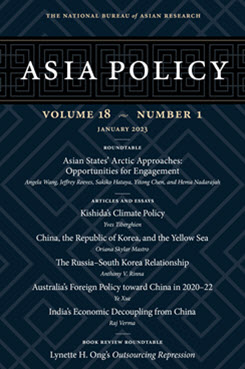Article in Asia Policy 18.1
India’s Economic Decoupling from China
A Critical Analysis
This article argues that, for India, economic decoupling from China in the aftermath of the 2020 Galwan Valley clash that led to casualties on both sides is difficult in the short to medium term and is detrimental to the Indian economy.
EXECUTIVE SUMMARY
MAIN ARGUMENT
India’s recent attempts at economic decoupling—attempts to reduce its economic dependence on China—have so far failed as evidenced by an increase in bilateral trade in 2021 relative to 2019 and 2020. Economic decoupling from China is infeasible in the near to medium term because the Chinese economy is deeply intertwined with the Indian economy. It will be expensive, and in some cases impossible, to replace China as a supplier in economic value chains. Moreover, reducing imports from China or restricting Chinese investment does not greatly hurt or punish China because its exports to and investments in India are a very small proportion of its global exports and investments. On the contrary, restricting investments from China into India will damage India much more than it will China. Chinese investments in India can play an important role in enhancing economic growth in the post-pandemic period by creating employment, strengthening the manufacturing sector, improving infrastructure, and increasing exports under Indian government’s Atmanirbhar Bharat Abhiyan (“self-reliant India campaign”).
POLICY IMPLICATIONS
- Economic decoupling will not restore the status quo ante on the disputed border.
- India should focus on enhancing exports and improving market access in China to reduce its trade deficit.
- Since Chinese enterprises intend to stay in India and there will always be security concerns regarding Chinese investments in the country, it is imperative for India to develop transparent and rational protocols to increase Chinese investments in a sensible and secure manner.
- The Indian government should realize that protectionism is not a solution for the country’s economic and political problems and instead undertake further economic reforms to boost national economic growth.
Raj Verma is an Associate Professor at the College of International Relations at Huaqiao University (China). Dr. Verma is also the Head of Research at Intellisia Institute, an independent think tank in Guangzhou, and an Adjunct Professor at Far Eastern University in Manila.


